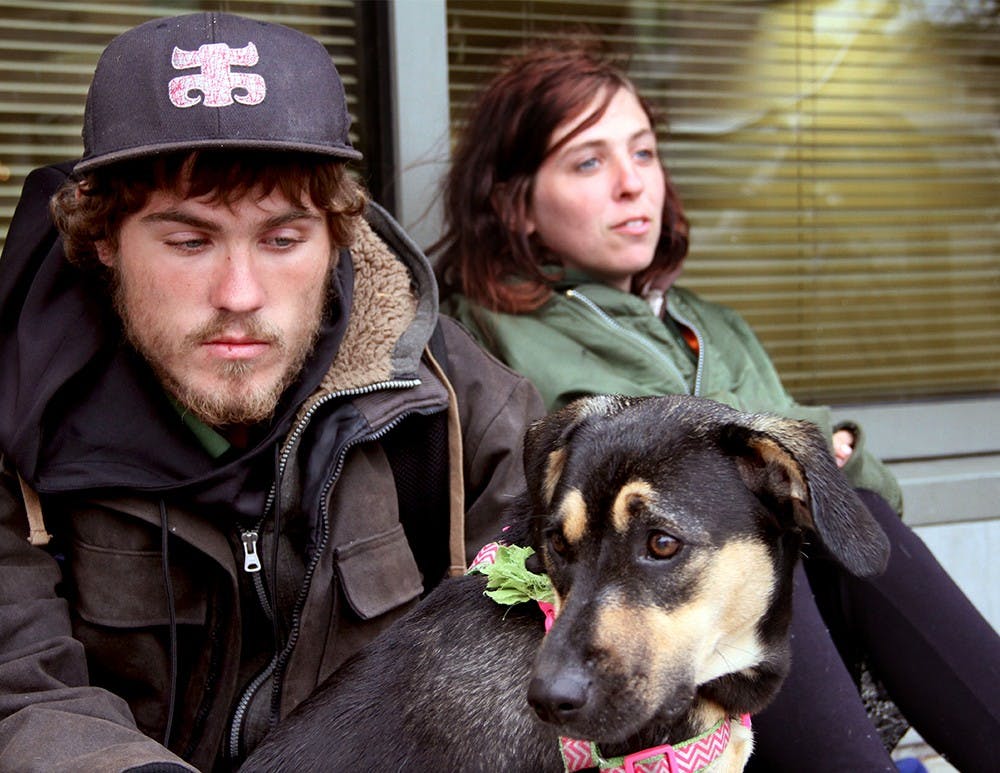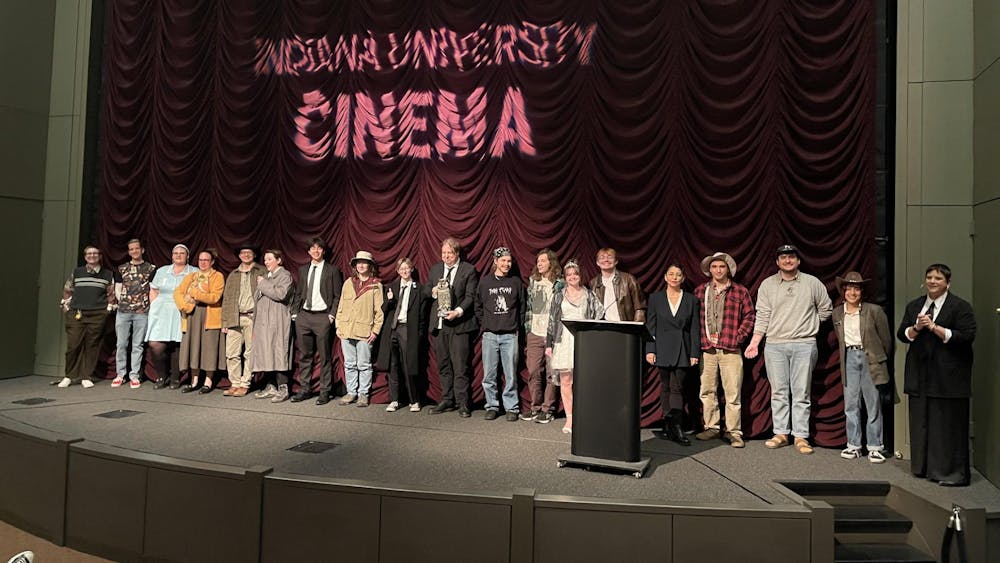Ivy Andrews and Kody Lydy are engaged with a baby on the way, and their home is a tent behind the Arlington Park Apartments.
Andrews, 28, and Lydy, 20, are transient Bloomington residents. On Wednesday afternoon, like on most of their afternoons, they sat on the sidewalks of Kirkwood Ave. with cardboard signs and asked those passing, many IU students, for any spare change.
Every now and then they were given a dollar, but most of the time the strangers strolled past with their attention focused elsewhere. The couple was approached by others surviving on the streets who were sometimes looking to trade items and sometimes looking to deal drugs.
Lydy and Andrews have filled out the public housing forms, used food stamps, attempted to stay in shelters and attended the local Shalom Center every morning. However, the couple always seems to encounter problems when applying for these services.
While housing could be an issue for transient people in Bloomington, there are plenty of services available to satisfy their basic needs, Bloomington Police Department Chief of Police Michael Diekhoff said.
“I would argue that there are enough services in this community that are provided that people shouldn’t go hungry,” Diekhoff said.
Andrews, who said she is one and a half months pregnant, stayed seated by Roxy, their dog, while Lydy took a more direct approach by confronting passersby. Whenever Lydy would collect spare bills, he would give them to Andrews, who stuffed them into her borrowed, several-sizes-too-big jacket.
“Here you go, baby,” Lydy said as he leaned over to kiss Andrews.
Bloomington gives transient people like Andrews and Lydy the necessities, such as sleeping bags and food, but the two cannot go into shelters because of Roxy, Lydy said.
They make as much money as they can before returning to their tent behind the apartment complex in an attempt to stay warm, Lydy said. The couple attends the Shalom Center every morning, has applied for public housing and uses food stamps, Andrews said.
“They keep kicking us off our housing and stuff,” Lydy said. “We keep putting all our information in, trying to get jobs and everything. It’s a big struggle, really.”
The Interfaith Winter Shelter, Bloomington’s low-barrier shelter, closed for the season March 31. Leaving the homeless community relying on blanket donations from the Indiana Recovery Alliance as the weather dropped to a low of 30 degrees.
While Lydy said he is working toward a job, Andrews said she needs to go back to school and earn a GED at Broadview Learning Center so she can continue receiving her food stamps.
After earning her diploma, she plans to attend Ivy Tech and from there transfer to IU, where her mother is a cook in the food court of Wright Quad, she said.
Andrews said she is excited to be going back to school for her two-year-old daughter who currently lives with her ex-husband.
“I want to show her if mommy can do it, she can do it too,” she said.
One of the programs available for the homeless is Centerstone Connections, a program that serves the chronically homeless in ten different Indiana counties, including Monroe County, Program Manager Brian Meyer said.
The primary goal of the program is to address the barriers that have been keeping people experiencing homelessness from securing permanent housing, Meyer said. Then to provide resources so they may maintain permanent residency, he said.
Bloomington, for its size, has a large homeless population primarily because of the number of resources it offers, Meyer said.
“Bloomington is a town that doesn’t turn its back on people,” Meyer said.
The police began a program called the Downtown Resource Officer program that allows six officers, who volunteered for the position, to deal exclusively with issues among the homeless in Bloomington, Diekhoff said.
He said the program helps to build trust with the transient community and the police. To do this, officers build an almost friendship with the homeless community, Diekhoff said. They are outfitted in a white shirt, differing from the typical blue, and are equipped with a cellphone so they may allow the homeless to make a call if needed.
The officers, whom Diekhoff said the people experiencing homelessness refer to as “white shirts,” help them by taking them to work and breaking up fights before they get too serious in an effort to avoid arrests.
Diekhoff said many of the people experiencing homelessness have addiction and mental health issues.
“We had several people that had such mental health problems that they just kinda got lost, and nobody knew where they were, and by talking to those people, we were able to figure out where they were from, and we actually reconnected several with their families,” Diekhoff said.
Andrews and Lydy said they only found out about the pregnancy recently.
“It’s stressful to be out here sitting and signing, and everyone just walks past me, and they see the ‘baby on the way’ and ‘just lost home,’ and they just don’t care,” Andrews said.
Lydy said he is a recovered cocaine addict.
He said the town is good for most of the necessities and the IU students can be helpful, but sometimes aggressive.
“They would rather just tell us to get a job and fight us and tell us we’re worthless pieces of shit,” Lydy said.
Diekhoff said the ultimate goal is to get everybody the services they need.
“I’ve said for many years, we can’t arrest our way out of this problem,” Diekhoff said. “With anything, you can try to do everything you can to help people, but if they won’t help themselves there’s not much you can do.”
As the dark clouds covered Bloomington on Wednesday afternoon and drops of rain began to fall onto the heads of those underneath, Lydy, Andrews and Roxy sought refuge underneath the overhang at the Monroe County Public Library.
They covered themselves with wet blankets and held their damp cardboard signs among the several others without homes gathered there.
“None of us, out here, homeless, like it,” Andrews said. “We have to struggle every day to make money.”






